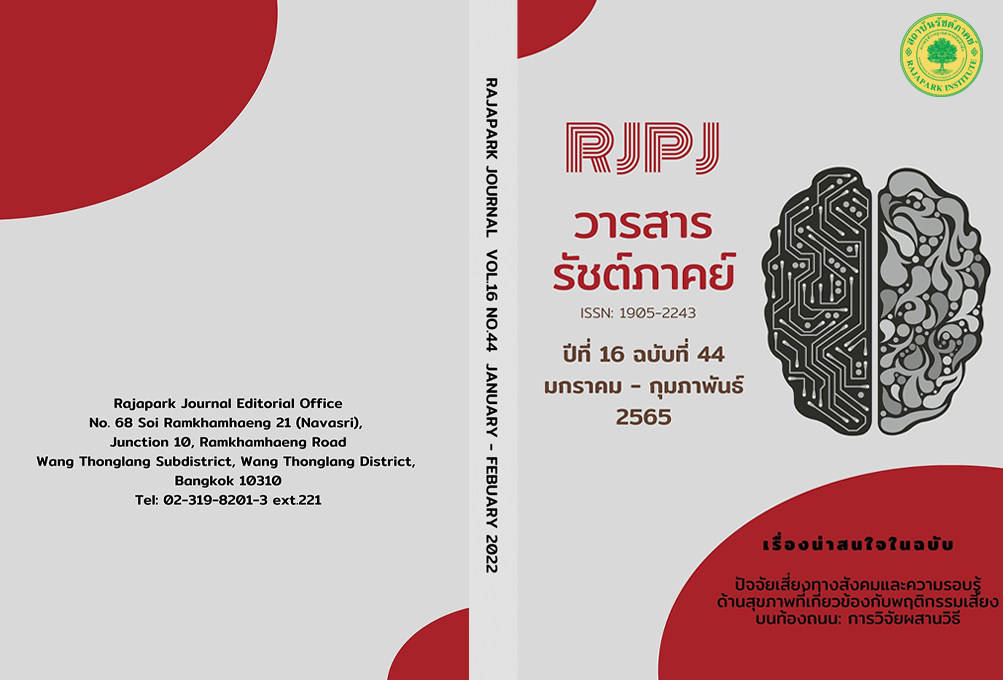Developing of Damrongdhama Center Efficiency for Thailand Complaint Management Center in 4.0th
Main Article Content
Abstract
The research aims to study. 1. Study the level of implementation of government policies. interpersonal relationship command and quality of life in work and the efficiency of the Damrongdhama Center as a complaint center for Thailand in the 4.0 era. 2. Study the influence of government policy implementation interpersonal relationship command and quality of life in work that affects the efficiency of the Damrongdhama Center as a complaint center for Thailand in the 4.0 era. 3. Study the policy guidelines for improving the efficiency of the Damrongdhama Center as a complaint center for Thailand in the 4.0 era. Data were collected by using a 5-level estimation scale questionnaire with a sample of 420 personnel of the Damrongdhama Center by quota randomization and In-depth interviews with 20 experts. Data were analyzed using content analysis techniques. The results showed that. (1) All variables studied in the moderate-high level (M=3.24-3.87) (2) Factors affecting the efficiency of operation of the Damrongdhama Center as a complaint center for Thailand in the 4.0 era include the implementation of government policies. interpersonal relationship command and quality of life in work (3) Policy approaches should focus on improving work relationships, quality of life, and enhancing command efficiency.
Article Details

This work is licensed under a Creative Commons Attribution-NonCommercial-NoDerivatives 4.0 International License.
Views and opinions appearing in the Journal it is the responsibility of the author of the article, and does not constitute the view and responsibility of the editorial team.
References
Agranoff, R., & McGuire, M. (2003). Collaborative Public Management: New Strategies for Local Governments. Washington, D.C.: Georgetown University Press.
Bateman, S. T., & Snell, A.S. (1999). Management: Building Competitive Advantage (4th ed.). Boston: Irwin McGraw-Hill.
Conger, J. A., & Kanungo, R.N. (1988). The Empowerment Process: Integrating Theory and Practice. Academy of Management Review. 13(3), 471-482.
Certo, S. C. (2003). Modern Management. Upper Saddle River, NJ: Prentice-Hall.
Cobb B. (1997). Communication Types and Sexual Protective Practices of College Women. Public Health Nursing, 14, 293-301.
Damrongdhama Center of Ministry of Interior. (2016). Complaint Resolution Action Guide. Damrongdhama Center. Retrieved from http://www.damrongdhama.moi.go.th/
Diamantopoulos, A., & Siguaw, A. D. (2000). Introducing LISREL: A guide for the uninitiated. London: Sage Publications.
Drafke, M. W., & Kossen, S. (2002). The Human Side of Organizations (8th ed.). New Jersey: Pearson Education.
Gulick, L., & Urwick, L. (1973). The Science of Administration. New York: Columbia University.
Hellriegel, D., Slocum, J. W., & Jackson, S.E. (2005). Management: A Competency based Aapproach (10th ed.). Mason: OH: Thomson/South-Western.
Huxham, C., & Vangen, S. (2005). Managing to Collaborate: The Theory and Practice of Collaborative Advantage. Abingdon, UK: Routledge.
Kotler, P. (1944). Management: Analysis, Planning and Control. New Jersey: Prentice Hall.
LaMastro, V. (2002). Commitment and Perceived Organizational Support. Retrieved from http://nationalforum.Com/13lama∼1.html.
O’Leary, R., Gerard, C., & Bingham, L. B. (2006). Introduction to the Symposium on Collaborative Public Management. Public Administration Review, 66, 6-9.
Phapong, J. (2015). A Study of Complaint Management Related to Village Health Volunteers of the Public Health Support Division. Retrieved from http://phc.moph.go.th/www_hss/data_center /dyn_mod/On_WebsiteV.2.pdf
Prince Damrong Rajanuphap Institute (2016). Report of a Research Study Entitled Evaluation of the Operations of the New Dimension Damrongdhama Center, According to the Viewpoint of the Officials Workers of the Provincial Damrongdhama Center, District Damrongdhama Center and People Receiving Services. Retrieved from http://www.stabundamrong.go.th/web/research1/research4.pdf
Robbins, S. P., & Coulter, M. (2003). Management (7th ed.). NJ: Pearson Education.
Schermerhorn, J. R. (1996). Organizational Behavior. New York: John Wiley.
Songnirun, V. (2009). Opinions Regarding the Factors Affecting Performance Efficiency of the Employees of Panasonic Electric Works Ayutthaya Co., Ltd.(Master of Business Administration). Phranakhon Si Ayutthaya Rajabhat University.
Sennok, S. (2015). Petition Efficiency Development of Damrongdhama Center: The Case Study in Nongsuea District, Pathumthani Province. Master of Political Science(Politics and Governance). Thammasat University.
Thammasat University Research and Consultancy Institute [TU-RAC]. (2008). Manual and Guidelines Participatory Administration of Government Agencies at the Ministry Level that is the Policy Level. Bangkok: Pinklao Press.
Thomson, A. M., & Perry, J. L. (2006). Collaboration Processes: Inside the Black Box. Public Administration Review, 66, 20-32.
Vangen, S., & Huxham, C. (2010). Introducing the Theory of Collaborative Advantage. In S. Osborne (Ed.), New Public Governance: Emerging perspectives on theory and principle of public governance (pp. 163-184). New York: Routledge.
Verma, R., & Boyer, K. K. (2010). Operations & Supply Chain Management-World Class Theory and Practice. London: South-Western.
Weihrich, H., & Koontz, H. (2005). Management: A Global Perspective. New Delhi: McGraw Hill.
Yavapraphas, S. (2005). Personnel Management in the Thai Government Sector: New Trends and Challenges. Bangkok: Golden Point.
Yawirat, N. (2009). Leadership and Strategic Leadership (7th ed.). Bangkok: Triple Group.
Yoon, J., & Thye, S. (2000). Supervisor Support in the Work Place: Legitimacy and Positive Affectivity. The Journal of Social Psychology, 14, 295–316.


